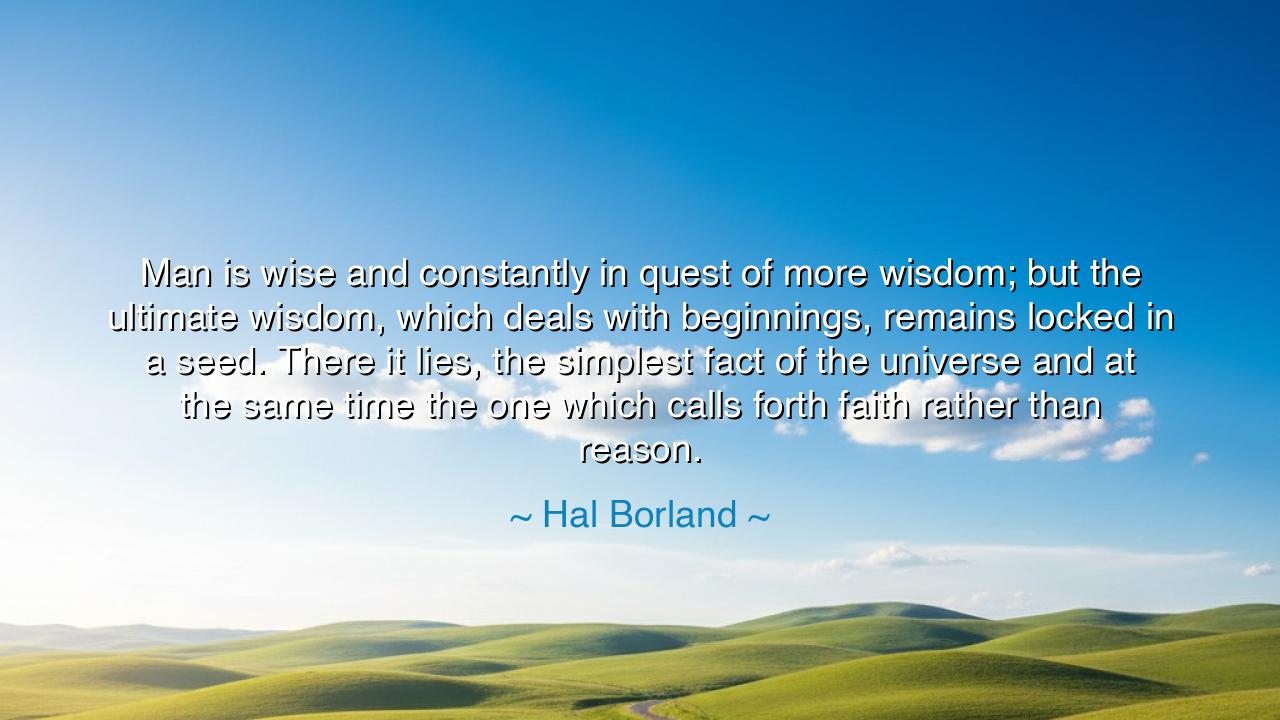
Man is wise and constantly in quest of more wisdom; but the
Man is wise and constantly in quest of more wisdom; but the ultimate wisdom, which deals with beginnings, remains locked in a seed. There it lies, the simplest fact of the universe and at the same time the one which calls forth faith rather than reason.






Hearken, children of the ages, to the reflective words of Hal Borland, who proclaimed: “Man is wise and constantly in quest of more wisdom; but the ultimate wisdom, which deals with beginnings, remains locked in a seed. There it lies, the simplest fact of the universe and at the same time the one which calls forth faith rather than reason.” In these words lies the eternal truth of human inquiry, the mysteries of creation, and the balance between reason and faith. While mortals pursue knowledge with tireless diligence, the fundamental truths—the origins of life and the universe—elude full comprehension, resting in simplicity and wonder.
Borland teaches that wisdom is both sought and revealed. Men and women may accumulate understanding through learning, reflection, and study, yet the ultimate wisdom—the knowledge of beginnings, of genesis and potential—cannot be grasped by reason alone. It is hidden in the small and simple, in the seed that contains the potential of life, and it demands faith, reverence, and humility to perceive its significance.
Consider the life of Gregor Mendel, who studied peas in quiet obscurity. In observing the patterns of inheritance within seeds, he glimpsed the foundations of genetic wisdom, long before humanity understood the laws he discovered. The ultimate principles of life lay within these tiny vessels, and it was through patience, observation, and faith in the process that he uncovered truths invisible to casual inquiry. Borland’s reflection is mirrored here: wisdom is latent, often found in the smallest, most unassuming forms, awaiting careful attention.
The ancients themselves revered the seed as symbol and vessel of potential and mystery. From the Stoics to the mystics of the East, they recognized that creation begins in the unseen and the humble, and that the most profound truths cannot be forced or fully reasoned, but must be honored, nurtured, and contemplated. Borland’s words echo this timeless insight: ultimate wisdom lies in beginnings, in the unseen, and calls forth faith as well as understanding.
Thus, his counsel is both guidance and wonder: cherish the small and seemingly simple, for within it resides the foundation of all knowledge and life. Approach the mysteries of existence with reverence, recognizing that not all truth can be measured or explained; some truths are to be observed, nurtured, and believed, like the seed that holds the tree within.
Carry this teaching, children of generations yet unborn: let your hearts and minds seek wisdom, yet bow to the mysteries that dwell in beginnings and simplicity. In the seed lies the silent promise of creation, the root of all understanding, and the call to faith that sustains humanity’s quest across the ages.






HHDao Huu Huynh
This idea feels almost mystical. It suggests that human intellect can explain many things, but not the origin of life itself—the spark that turns potential into existence. I wonder if Borland means that true wisdom begins where logic ends. That’s both comforting and unsettling. It implies that part of being wise is accepting mystery, acknowledging that some truths are meant to be experienced rather than solved.
VDhan van duc
I love how this blends philosophy and nature. It makes me think about how every living thing starts from something hidden, unassuming, and yet full of infinite design. Maybe Borland is saying that our pursuit of knowledge should also involve patience—just as a seed must lie dormant before it grows. Could it be that ultimate wisdom isn’t discovered through analysis, but through observation, reverence, and trust in life’s quiet processes?
HUHoang Uyen
This thought makes me pause. It feels like Borland is exploring the tension between what can be known and what must be believed. If beginnings require faith rather than reason, does that mean wisdom is not purely intellectual but spiritual? It’s interesting how the metaphor of a seed carries both potential and mystery—it contains everything, yet reveals nothing until time and growth unfold its truth.
KNKhanh Nguyen
There’s something paradoxical here that really speaks to me. We seek wisdom through complexity—books, theories, discoveries—yet Borland points us back to the simplest symbol of creation. It’s like he’s saying that wisdom doesn’t just grow from knowledge but from humility before life’s origins. Can faith and reason coexist in that search? Or are we destined to keep circling around truths we can sense but never fully comprehend?
TNThao Nguyen
I find this reflection beautiful but also humbling. It suggests that even as humanity advances intellectually, the deepest truths remain elusive—contained in something as small and ordinary as a seed. I wonder if Borland is hinting that simplicity holds the greatest mysteries. Maybe he’s reminding us that science and spirituality aren’t opposites, but different ways of approaching the same profound question: where does life’s wisdom truly begin?